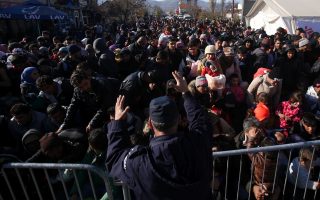Where is Greece heading? Four leading observers share their views

Last year, it was the escalating uncertainty of the government's “proud negotiation” with foreign creditors, with its familiar, devastating outcome. This year, it is the first review of Greece's third bailout under the shadow of a spiraling refugee crisis that threatens to transform the country into a mini-Lebanon inside the European Union. The debate at home, projections about what will come next – a risky exercise in any event – is influenced, more so than in maturer democracies, by the political beliefs of each individual oracle: The universe of possible outcomes is shaped by what they want.
A cool, detached perspective, therefore, can help distinguish the wood from the trees. Kathimerini asked four leading foreign observers of Greek affairs to make their predictions about where the country is headed in the next few months. Unfortunately, none is optimistic.
TOM NUTTALL, Charlemagne columnist at The Economist
A few weeks ago it looked possible for Greece to exploit its position on one crisis to win concessions on another. The Germans had quietly let the SYRIZA-led government know that cooperation on refugees – acceleration of the hot spots, more effective registration and fingerprinting, an agreement to return migrants to Turkey – would help its position in debt relief talks later this year. The European Commission seemed willing to play along.
But the migrant situation has deteriorated so rapidly that the two issues now look more likely to accentuate each other, for several reasons. First, the cost of providing food and shelter for tens of thousands of migrants bottled up inside Greece will take a bigger fiscal toll than expected. Second, the warmer weather and calmer waters of spring will see a drastic rise in the number of migrants crossing the Aegean from Turkey, just as the first review of Greece's bailout may be starting to slide.
Third, border closures along the migratory trail to Germany, and the apparent willingness of officials in Brussels to see Greece turned into a giant (if temporary) refugee camp, will harden the mood among Greek voters and their representatives. Already dealing with a thinning majority, Alexis Tsipras will find it tougher to force through the unpopular tax rises and pension cuts his creditors demand if Greeks feel like the rest of Europe has turned its back on their plight.
Finally, Angela Merkel has been dramatically weakened by the migrant crisis. Last summer Germany's chancellor was strong enough to strike a deal with Tsipras that she could push through the Bundestag, against the misgivings of her finance minister, Wolfgang Schaeuble, and other hardliners. But Merkel's open stance toward migrants has proved hugely divisive, notably within her own Christian Democratic Union and its Bavarian sister. That leaves the chancellor with less political capital to spend should the Greek bailout run aground.
Greece's financial woes are in large part a product of history, of political mismanagement and fiscal irresponsibility. Its migrant problems are wholly an accident of geography. For most of last year it looked as if the two issues could be kept apart. No longer.
MUJTABA RAHMAN, leader of Eurasia Group's Europe practice
It is hard to believe how quickly the certainties offered by European Union membership can disappear. For half a decade, Greece has edged from month to month, unsure of its chances of remaining in the eurozone. It has now been effectively jettisoned from the Schengen zone and lies at risk of becoming a migrant trap.
Two familiar but separate crises – one related to debt, the other to migrants – are clearly on a collision course in Greece. Creditors will continue to argue that the burden posed by migrants on the Greek state budget is only a tiny proportion of the sums involved in the bailout. Given the contribution made by other EU states to build new “hot spots,” they do have a point. But the onerous reforms required by the bailout are political challenges which will be even harder to overcome as the electorate frets over the buildup of migrants.
Greece is being penalized by its location. With islands only miles from the Turkish coast, it is the first European country on the “Balkan route” migrants have been taking to Germany. Greece’s isolation from the rest of the nominally borderless Schengen zone means they must leave it before entering again further north. Smaller Schengen states such as Hungary, Slovenia and Austria have effectively taken matters into their own hands and are limiting the number of migrants they let through. This has forced countries further down the route to take action and Greece is quickly becoming overwhelmed by the Former Yugoslav Republic of Macedonia’s decision to tighten its border last week.
Over 1 million migrants took the Balkan route last year. Even if some are deterred by rumors of bolstered borders, flows will not diminish substantially. Still panged by debt and uncertainty, Greece’s 11-million-strong economy (next to Turkey’s 75) is in no position to accommodate so many migrants and the population knows this. Still, their bailout prescribes reforms including contentious measures to reduce the burden pensions exercise on the budget.
The International Monetary Fund has criticized the government’s proposals by saying they will not lead to enough up-front savings. It is difficult to imagine how the government will go any further with a shaky majority and protests already turning nasty. As always, the Commission is more sensitive to Greece’s political situation, questioning what the government can achieve with a two-seat majority, and more willing to work with a reform that will deliver results over time. Ultimately, however, the negotiations are likely to go more the IMF’s way: Its calculations will not change as long as the Eurogroup refuses to consider additional debt relief.
In more normal circumstances, the government would try to move quickly to pass its first bailout review before Easter. This would imply more onerous pension reforms, as well as other cuts to make primary surplus targets more achievable. But news that the FYROM border is closed changes this. How can Prime Minister Alexis Tsipras calm swelling protests by announcing even more cuts, just as Europe leaves Greece to deal with the migrant crisis by itself? Unable to hide from this double crisis, Tsipras may resort to his favorite method of catharsis by calling an early election. A fresh democratic endorsement could provide cover to progress with his reform agenda. But given the appeal of New Democracy under Kyriakos Mitsotakis, it could also make for an even less operable Hellenic Parliament.
MARCUS WALKER, Wall Street Journal (European Economy editor)
Greece finds itself in a struggle on two fronts that could test its resilience as much as anything the country has seen in the crisis era.
Closed borders and an open review of the bailout program could, in the worst case, leave Greece scrambling to take in a six-figure number of refugees and to pay out billions on debts due in July.
Despite Chancellor Angela Merkel’s efforts stop the uncontrolled refugee outflow from Turkey, other European countries have already decided that closing Balkan borders is the only effective measure, despite the risk of a humanitarian crisis in Greece.
Swelling numbers of marooned migrants, local conflicts over where to put them, resentment over Europe's readiness to ringfence Greece: not the best backdrop for a tense phase of negotiations with creditors that has an explosive potential of its own.
If Alexis Tsipras's doomed attempt in 2015 to play chicken with Germany frazzled Greeks' nerves, this spring's face-off could fray the shaky agreement that averted euro exit.
The needs of Tsipras, Merkel and the International Monetary Fund resemble an impossible triangle.
Tsipras needs eurozone money to avoid default in July on about 3.5 billion euros of debts, including more of the European Central Bank-held bonds that set last summer's Grexit deadline.
Merkel needs the IMF to sign a new loan program with Greece before she can ask her MPs – already losing faith in her over migration – to release the money.
The IMF, steeped in doubt that the Greek bailout will ever work, doesn't believe Greece can hit its fiscal targets without taking an ax to pensions. It wants to see a plan that saves 4.5 percent of GDP by 2018.
At this point in Greece's depression, that's like asking for the government's head. The IMF’s alternative – generous debt relief by Europe – looks politically unpalatable in Germany.
The main reasons for optimism are that Europe has so far shown a peerless talent for muddling through, confounding many predictions of collapse, and that the Continent's most powerful politician, despite her travails in Germany now, will bend over backward to stop the European project disintegrating.
But she'll need Greece to do likewise.
DANIEL HOWDEN, former correspondent of the BBC in Athens
When the slopes of Mount Ymittos were ablaze last July it felt as apt as it was depressing. The fire defenses had been vandalized by property speculators so it burned for days, throwing a pall of smoke that sat like judgment on the Parliament building below. A forlorn firefight, hobbled by corruption, that left a scarred landscape of self-inflicted wounds, metaphors are rarely so exact. The defiance of Alexis Tsipras in the face of demanding debtors was exposed as a bluff. The crisis ended in miserable, incoherent capitulation.
As bad as the terms were, Greece remained in the eurozone. Surely this was the bottom of the crisis and some form of jaded stability would follow?
No.
The full consequences of inept leadership, of a total absence of strategy and the souring of foreign relations will arrive over the next six months.
They will be bleak.
The populists who inveighed against “archenemy” Germany and allowed themselves to be used by Vladimir Putin were congratulated in some quarters for their swaggering realpolitik. They allowed Greece’s European future to be questioned for months. This is the groundwork that Hungary and others now build on to isolate Greece. Meanwhile, Putin holds the levers to drive huge flows of Syrian refugees into Turkey and across the Aegean.
Having allowed itself to be used as a laboratory for austerity, while sabotaging any useful reform, Greece’s political establishment proved its incompetency. A majority of Greeks responded by voting repeatedly for solutions that did not exist.
So much that has been taken for granted from open borders, to functioning banks and the remains of a real economy are now in question. While angry farmers blockade and MPs measure the precise value of each vote on pension reform, debt repayment deadlines loom again. All signs point to a collapse of the ruling SYRIZA-Independent Greeks coalition before July.
Another election, this time fought against a backdrop of swelling refugee camps, is unlikely to offer solutions. Given the scale of the self-inflicted debt crisis, the margin for error was always vanishingly thin.
By the summer, Greece will once again be left looking for leadership beyond its own borders. Those leaders, primarily Germany’s Angela Merkel, have never had less to lose in leaving Greeks to their fate.





